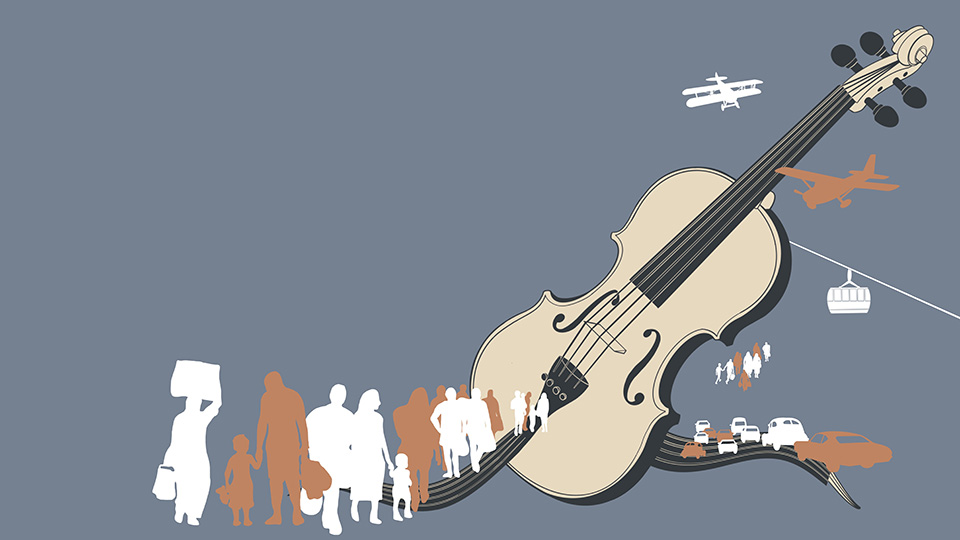Music, Migration and Mobility Conference

- Online, hosted by the Royal College of Music
- 12-14 September, 2022
This conference aims to investigate music as a mobile phenomenon, and the history of music as animated by mobility rather than fixity. It strives to reflect critically on methodological approaches and theoretical framings of music, especially the music of migrants. It will feature over 25 papers and keynote lectures that explore music and musical history through the lens of mobility, as opposed to static, rigid categories of national or geographical belonging.
The study of mobility/mobilities offers approaches capable of vivifying cross-disciplinary discussions between work in a wide variety of fields, including musicology and music practice, history, geography, philosophy, cultural studies, literary studies, sociology, anthropology, media studies, Jewish studies and education.
The conference will explore the potential of existing and new ways of approaching the study of mobility in relation to music and the arts. Approaches towards mobility, such as the ‘new mobilities paradigm’ (Sheller and Urry 2004), position mobility/mobilities as being fundamental to our social and cultural worlds.
Exploring the mobilities of people, objects (such as musical instruments, music books, mobile players, car radios), concepts and practices (Bull 2004; Grosch 2010; Gopinath and Stanyek 2014) affords us with opportunities to rethink social and political structures, and indeed human experiences (Cresswell 2006), in far less static and more nuanced and fluid terms.
Approaches centring mobility/mobilities also allow for focus on the ways that mobilities are unequally accessed, positioned, relational, and perhaps unjust (Sheller 2018), and, as a result, potentially slowed, stopped, stuck, or impeded. Researchers are, thus, as likely to talk of immobilities in order to reflect the uneven experiences and power relations that shape mobility, as they are to speak of meaningful movements. One example is Berish’s work (2012) on the experience of Black jazz musicians in the United States across infrastructures of automobility and race. Another example would be the effect of recent changes in access to mobility for British musicians after Brexit.
There is, indeed, no single prevailing framework for approaching mobilities, but rather a multitude of ‘mobile methodologies’ (Merriman 2014; Büscher, Freudendal-Pedersen, Kesselring, Kristensen 2020) which can be used to apprehend mobilities and immobilities in connection with traditional and innovative research methods. Further, in centring the mobilities and immobilities of, say, migrants, one can cast new light on concepts like exile, helping us to think critically about inherited models that ultimately privilege stasis in describing discrete and delineated movement ‘from there’ ‘to here.’
The conference will offer an opportunity to discuss the methodological, conceptual, and practical challenges that arise from such an approach, and to enter into a dialogue about its usefulness.
As a world-leading advocate for the future of music, the Royal College of Music is committed to being an agent of positive and meaningful cultural change, embracing the ideals of an open, innovative and just society.
This conference aims to build on the work of the AHRC-funded Music, Migration, and Mobility project, undertaken in partnership with Royal Holloway University of London and The University of Salzburg. Since it began in 2019, the project has aimed to investigate the diverse and uneven mobilities of migrant musicians who fled Nazism and fascist regimes for Britain in the years leading up to the Second World War. The project aims to determine how foregrounding mobility can help us to better understand the legacies and impact upon culture of migratory musicians and other mobile artists and cultural figures.
In the context of migration, the new mobilities paradigm helps us to challenge the notion of (transnational) mobility as an abnormal human experience, which in turn allows us to re-evaluate the lives and legacies of migratory peoples.
- Norbert Meyn, Royal College of Music (Chair)
- Peter Adey, Royal Holloway, University of London
- Nils Grosch, University of Salzburg
- Beth Snyder, Royal College of Music/University of North Texas
- Michael Holden, Royal Holloway, University of London
How to book
The conference will be held on Zoom on 12-14 September.
A £1.95 booking fee applies.
On day three of the conference (14 September, 1.15pm UK time) we are planning an Information Forum for attendees.
Please indicate whilst booking your ticket if you would like to give a short (three-minute) presentation to inform the conference about research and other activities related to music, migration and mobility.
Conference schedule
The timings for the online event can be found in the downloadable PDF.
Speaker biographies and abstracts
Find out more about the conference speakers and read their abstracts in the downloadable PDF.
Get in touch
For general enquiries about the conference please contact our Research Coordinator Helen Kuby.








